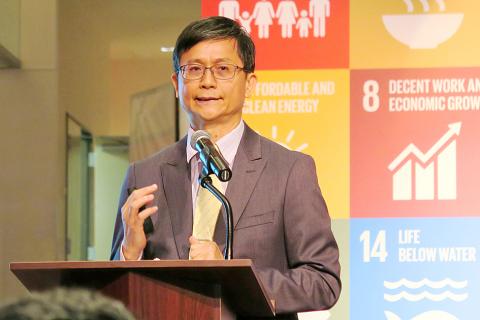Environmental Protection Administration (EPA) Deputy Minister Chan Shun-kuei (詹順貴) resigned yesterday, saying he refused to cave in to pressure from Premier William Lai (賴清德) to sway the agency’s environmental impact assessment (EIA) system.
Chan was a noted environmental attorney prior to being asked to join the Cabinet by then-premier Lin Chuan (林全) after President Tsai Ing-wen’s (蔡英文) Democratic Progressive Party (DPP) administration took office in May 2016 .
Chan first tendered his resignation after Lin stepped down and was replaced by Lai in September last year, citing what he said was Lai’s frequent defiance of democratic principles during his time as Tainan mayor, but was persuaded by Tsai to stay.

Photo: CNA
Amending the Air Pollution Control Act (空氣污染防制法) and the Environmental Impact Assessment Act (環境影響評估法) were the primary reasons he agreed to join the Cabinet, Chan wrote on Facebook yesterday morning.
However, over the past year, officials have not been allowed to thoroughly discuss policies at Executive Yuan meetings, he wrote.
While his goals have not been fully realized, the credibility of the EIA system is being undermined by pressure from Lai, which made him feel ashamed for not being able to accomplish his duties and led to his decision to leave, he wrote.
His announcement came four hours before the EPA’s EIA grand assembly was to open to review CPC Corp, Taiwan’s (台灣中油) plan to construct a third liquefied natural gas (LNG) terminal in Taoyuan.
Chan said he was not trying to influence the assembly with his resignation.
He thanked Tsai, Lin and EPA Minister Lee Ying-yuan (李應元) for supporting his decision, while apologizing for any inconvenience his resignation might cause.
At a news conference about the terminal project yesterday afternoon, Lee praised Chan’s contributions over the past two years and said that he was reluctant to let Chan go.
Later in the day, Executive Yuan spokeswoman Kolas Yotaka confirmed that Chan’s resignation had been approved.
The Executive Yuan understood the stress he was under from environmental groups’ criticism of his role in the EIA approval for the proposed Shenao thermal power plant in New Taipei City, she said in a statement.
Although the CPC’s LNG terminal project is crucial for the government to achieve its “nuclear-free homeland by 2025” policy, the Executive Yuan did not disregard environmental protection principles in its promotion of the project, she added.
The Air Pollution Control Act was amended and promulgated in August. The draft amendments to the EIA act were published by the EPA in September last year, but were not listed as a priority bill in the legislative session that began on Sept. 21.

MAKING WAVES: China’s maritime militia could become a nontraditional threat in war, clogging up shipping lanes to prevent US or Japanese intervention, a report said About 1,900 Chinese ships flying flags of convenience and fishing vessels that participated in China’s military exercises around Taiwan last month and in January last year have been listed for monitoring, Coast Guard Administration (CGA) Deputy Director-General Hsieh Ching-chin (謝慶欽) said yesterday. Following amendments to the Commercial Port Act (商港法) and the Law of Ships (船舶法) last month, the CGA can designate possible berthing areas or deny ports of call for vessels suspected of loitering around areas where undersea cables can be accessed, Oceans Affairs Council Minister Kuan Bi-ling (管碧玲) said. The list of suspected ships, originally 300, had risen to about

DAREDEVIL: Honnold said it had always been a dream of his to climb Taipei 101, while a Netflix producer said the skyscraper was ‘a real icon of this country’ US climber Alex Honnold yesterday took on Taiwan’s tallest building, becoming the first person to scale Taipei 101 without a rope, harness or safety net. Hundreds of spectators gathered at the base of the 101-story skyscraper to watch Honnold, 40, embark on his daredevil feat, which was also broadcast live on Netflix. Dressed in a red T-shirt and yellow custom-made climbing shoes, Honnold swiftly moved up the southeast face of the glass and steel building. At one point, he stepped onto a platform midway up to wave down at fans and onlookers who were taking photos. People watching from inside

Japan’s strategic alliance with the US would collapse if Tokyo were to turn away from a conflict in Taiwan, Japanese Prime Minister Sanae Takaichi said yesterday, but distanced herself from previous comments that suggested a possible military response in such an event. Takaichi expressed her latest views on a nationally broadcast TV program late on Monday, where an opposition party leader criticized her for igniting tensions with China with the earlier remarks. Ties between Japan and China have sunk to the worst level in years after Takaichi said in November that a hypothetical Chinese attack on Taiwan could bring about a Japanese

STREAMLINED: The dedicated funding would allow the US to transfer equipment to Taiwan when needed and order upgraded replacements for stockpiles, a source said The US House of Representatives on Thursday passed a defense appropriations bill totaling US$838.7 billion, of which US$1 billion is to be allocated to reinforcing security cooperation with Taiwan and US$150 million to replace defense articles provided to the nation. These are part of the Consolidated Appropriation Act, which the US House yesterday passed with 341 votes in favor and 88 against. The act must be passed by the US Senate before Friday next week to avoid another government shutdown. The US House Committee on Appropriations on Monday unveiled the act, saying that it allocates US$1 billion for the Taiwan Security Cooperation Initiative